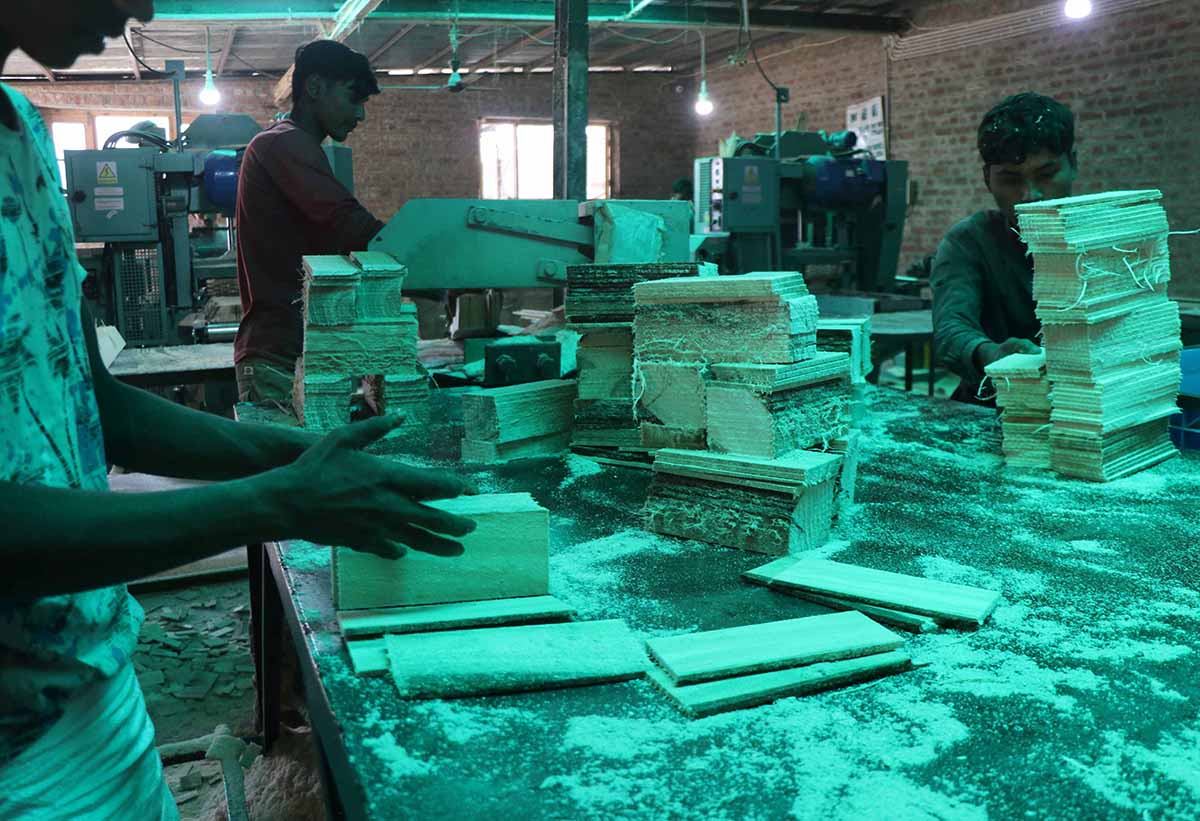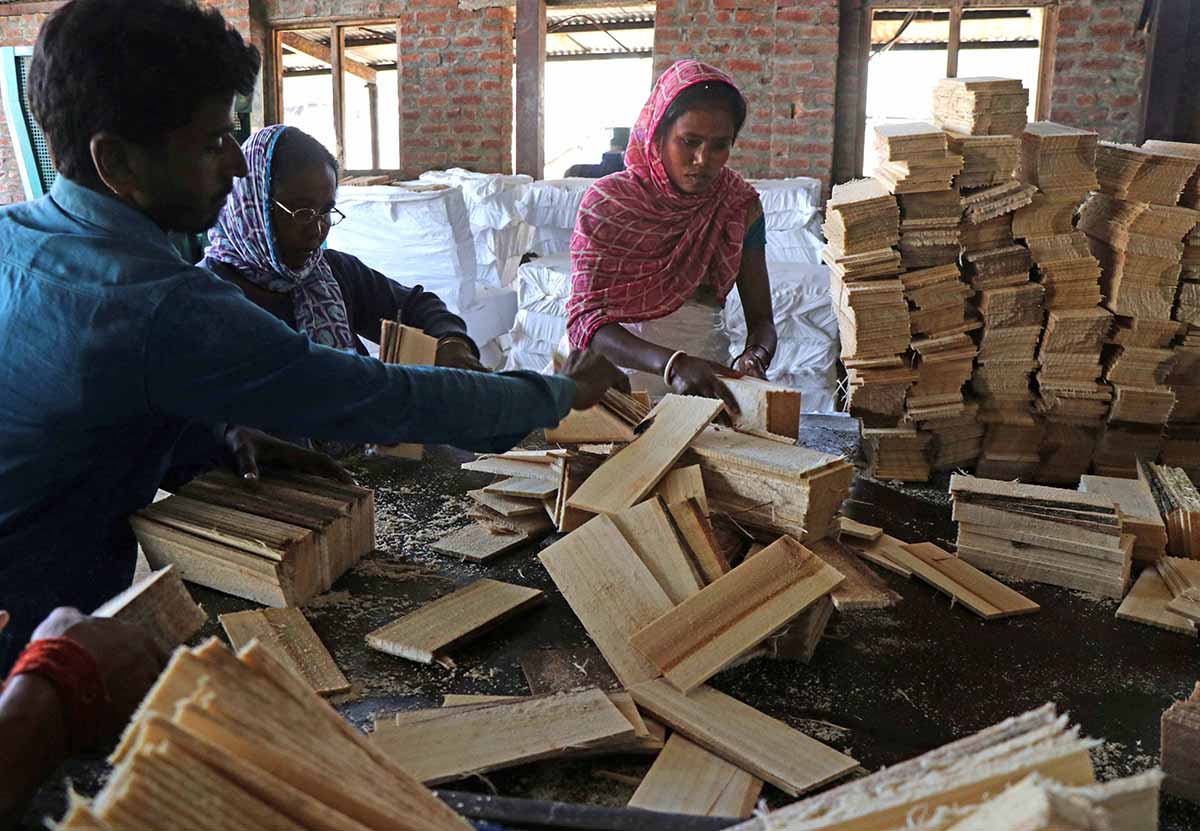A small village in Pulwama supplies more than two-thirds of the raw material to one of India’s major pencil makers pushing Chinese and German suppliers out of competition reports Umar Mukhtar

Every morning Irshad Ahmad, 32, a resident of Kakapora in Pulwama dusts his bicycle and sets out for Ookhu – a village almost 2 km from his home. He works there at a unit that makes pencil slates.
Ookhu is located along the bank of Jhelum. The houses are surrounded by band-saw mills. Unlike other villages in the neighbourhood, Ookhu has a distinction: It is known as ‘pencil village’. Almost 250 households live in this dusky village.
Ahmad works there till 5 in the evening and returns home happy. “I have been working here for the last 5 years.”
There are around 3 units in this small village that manufactures slates- the raw material for pencil manufacturing.
The Oldest Unit
Jhelum Agro Industries is one among the three units that produces the raw material. It was the first one to be established in 2013. Before this, the unit used to process raw material in the form of logs and send it to Jammu and Chandigarh.

“We used to send logs to Hindustan Pencils,” said Manzoor Ahmad Allaie, the promoter of the Jhelum Agro Industries.
Allaie’s rise has an interesting story. Born to a timber loader Abdul Azaiz, Allie, 44, was watching his father work overtime to manage his family comprising two sons and a daughter. In 1996, Manzoor did his matriculation and a year later when the family sold a small piece of land for Rs 75,000, Manzoor insisted that the family will put up a small band-saw unit.
Allaie’s got into apple box packaging that is a major peripheral exercise. However, this job is seasonal. Manzoor wanted to do something more. Once in 2012, he travelled to Jammu and met the pencil makers and somehow convinced them that he can supply the raw material. That marked the beginning of a long story.
The relationship development and the appetite for the raw material surged. The entire family got into the slate making including their father. It was a great day when Manzoor hired 15 locals to help manage his unit.
As his fund requirement surged, Manzoor got some loan from the Jammu and Kashmir Bank and installed a generator. This helped him to work during the odd hours also. It was his pioneering work that linked the entire village to the pencil slate making.
Investment In Machinery
The raw material being supplied was of good quality and relatively cheap. So, in consultation with the Hindustan Pencils, a few units among many decided to set up the plants here that would make slates, instead. It was an upgrade from level zero to Level 1.

“Making a slate is almost 50 per cent work done in manufacturing a pencil,” said Ahmad. Slate is a perfectly cut wooden block from which at least four pencils can be made.
It costs around Rs 2 crore to set up one pencil slate unit. “We have to invest in machinery, some of which are to be imported,” Allaie said. “Most of the units invested their savings and some had to lift loans to set up the unit.”
Raw Material
The units get the raw material from Kashmir’s abundant poplar tree. “We have two types of poplars here; one is our own domestic variety and the second is Bulgarian – commonly called the Russian Poplar. We can get it from the later one only, that too from the one that grows in wetlands,” said Ali Mohammad Wani, a dealer who supplies material to the units.

“Such trees contain good moisture content that makes these slates soft,” Wani said. Most of the pencil makers across the world use wooden slates because children have a tendency to even eat the pencil while writing.
The Russian poplar was first introduced into Kashmir in 1982 as part of a World Bank aided project. It was basically to uplift the economic condition of farmers in the countryside.
Processing of slates
Once poplars are cut, they are then sent to the band-saw mills to make small logs from which slates are later made.
”We get the best quality of trees in the low-lying areas. They are easy to transport and cheap comparatively,” Wani said. “A slate has the dimensions of 78 x 77mm, and 5.2 mm thickness. Out of this slate size, eventually, four pencils are made”.

These slates need to be dried first. They are dried manually – either sundried or dried by machines,” said Allaie who has two drying machines (seasoning plants) installed at his Lassipora unit. “In bad weather or during winters we mostly dry our material in seasoning plants.” It takes them three full sunny bright days to sundry the processed material.
Once they are dry, the female workers sort them and pack them into the bags. One single bag has 800 slates in it.
Employment Generation
A unit employs normally 100 people and most of them are females. Females have to identify the slates from saw-dust. Allaie’s unit employs around 180 people. “We have both locals as well as non-locals working here,” said Allaie.
Sameena, a resident of a nearby village said that she is working at the unit for the last five years. “Many girls from the surrounding villages come here and work. This industry has provided employment to many girls for whom otherwise it would have been difficult to find a suitable job,” Sameena said.
Rakesh is a non-local labourer working at the Jhelum Agro Industries. He is there with his entire family. “I am here for last one year. I do the work of making the slates of actual size,” he said.

Prior to the establishment of these units, the executive at their buying companies have told them, China and Germany used to supply most of the raw material to the Hindustan Pencils. Now Pulwama surpasses all of them. “They prefer our material as its quality and cost are comparatively efficient than what they used to get from other countries,” Allaie said. Almost 70 per cent of the material is supplied from Kashmir, Allie added.
The Second Unit
Barkat Agro Industries is another unit. It employs around 160 people, 100 of them are natives. Feroz Ahmad, the unit promoter, said his unit was the second unit established in the valley in 2014.
A unit approximately supplies around 10 lakh bags of slates to pencil manufacturing factory a year. According to him, this sector gives the highest GST than any other sector for the last 4 years. “This industry has annual Rs 100 crores plus turnover,” Feroz said.
To run a unit like this needs a lot of skilled labour force, like a band-saw driver, plank cutter, machine handler and also unskilled labour who manually get slates out of the sawdust.
Feroz believes that raw material is gradually declining. The recent move by the government where mass cutting of the poplar trees was ordered to contain the spread of the Coronavirus, has led to a decrease in the raw material. Earlier, the same variety of poplars was cut down on a mass scale to prevent the mass allergic influenza in Srinagar and its outskirts. “Government should intervene at the earliest, so that it will not be a crisis in the near future,” said Feroz.
Making Of A Pencil
These slates are finally given the pencil shape in units of Hindustan Pencils at different places in Jammu and Chandigarh. But the unit holders here are quite optimistic that they too can do it provided they get a helping hand.
“There is a possibility that someday we can set up a full-fledged pencil factory here in Kashmir provided government incentivises it. The big industrial units work on the concept of mass production. But we are small entrepreneurs. We can go through it only if we get some incentives or support from the government in the form of tax rebates,” said Ahmad.
As the village restricted their growth, some of these unitholders later moved to Lassipora Industrial Estate to set up their units for more production. There are currently eight units at the industrial estate. It was Hindustan Pencils that initially gave them the technical knowhow to operate.
In Lassipora
DOMS is another pencil manufacturing pencil that has set up two units in the Lassipora industrial estate. All these entrepreneurs who have set up these units are from the Pulwama district.
Hindustan Pencils is the world’s second-largest pencil making company and owns the famous Natraj and Apsara pencils. The company gets around 70 per cent of its raw material from Pulwama.
Acknowledgement
Recently in his Mann Ki Baat, Prime Minister Narendra Modi made a special mention of this pencil hub in Kashmir.
“Today, Pulwama is playing an important role in educating the entire nation. Today, if the students across the nation do their homework, prepare notes, it is because of the hard work of the people of Pulwama,” Modi said in his address. “Almost 90 per cent of the demand for pencil slate in the country is met by the Kashmir Valley. And Pulwama has a big share in that. At one time, we used to import the wood for pencils, but now, Pulwama is making the country self-reliant in this field.”

Though Modi wrongly mentioned the use of Chinar wood (Cutting Chinar in Kashmir was a cognizable offence in the erstwhile state), it is actually the poplar that is being used for making a pencil. Chinar wood is hard and harsh, unlike poplars. But for the village, it was a huge endorsement to the efforts they have been putting in for a long time now.
“Oukhoo in Pulwama is known as the Pencil Village. There are many units engaged in the production of pencil slates which are generating employment. And in these units, women are working in large numbers. Pulwama earned this distinct identity when locals here decided to do something novel. They took risk and dedicated themselves to it,” Modi asserted. “I appreciate the brothers and sisters of Pulwama and their families who are making an invaluable contribution in educating the young minds of India.”
Problems
While the acknowledgement to the village efforts has come from the highest office in India, the local administration has not been as attentive as they should have been towards the requirements of the village.
The unitholders at Ookhu demand that the village be declared as an industrial estate zone, so that they can reap the benefits of an industrial zone. For the last four years, they are demanding only 12-hour power supply, but they are yet to get it.
“If we will have round the clock power supply, we do not need to depend on generators. We have to spend around Rs 20,000 on diesel for a day in load-shedding,” said Farooq Ahmad, manager of the Jhelum Agro Industries.
Ookhu has about 14 small and big units mostly catering to processing of wooden logs. Apart from those, there are five brick kilns, one tubular processing unit and many other band-saw mills.
“Almost 3000 people work in this small village,” said Farooq Ahmad. “If we get the facilities, we would improve the output and that will essentially help more people to work with us.”















